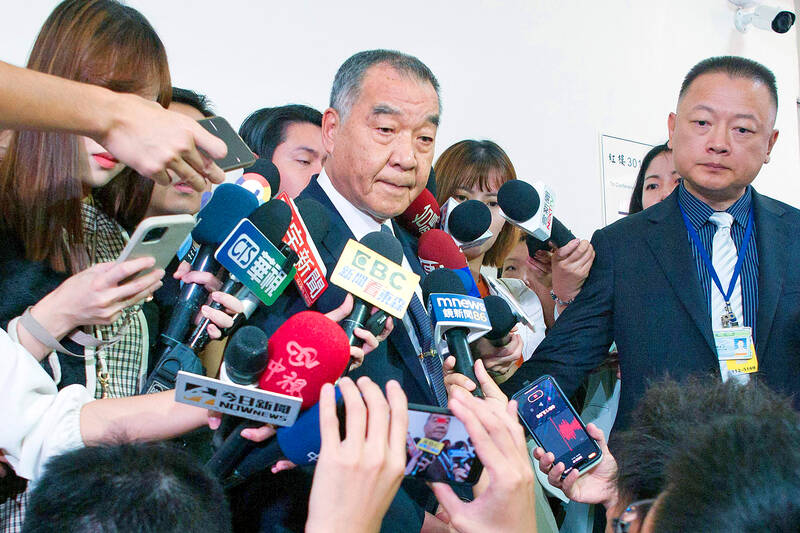The Ministry of National Defense has appointed a task force to study the war between Israel and Hamas, Minister of National Defense Chiu Kuo-cheng (邱國正) said yesterday.
The task force was created with the understanding that intelligence is a key factor to prepare against potential enemy attacks, Chiu said when asked by reporters what lessons the war held for Taiwan.
While Taiwan should “make preparations for war, it should not court war,” as collateral damage can be “harrowing,” Chiu told reporters before attending a meeting of the legislature’s Foreign and National Defense Committee.

Photo: Sam Yeh, AFP
Taiwan’s armed forces hope to prevent war and they have been working tirelessly to that end, while doing their best not to misjudge situations, he said.
The military has been closely monitoring activity near the country’s territorial waters, paying close attention to signs of enemy advancement, he said.
Asked whether Taiwan was capable of calling up 300,000 reservists in a single day as Israel has done since the Hamas incursion on Saturday last week, Chiu did not give a direct answer, saying only that Taiwan is a small country and its armed forces have mobilization plans in place.
Attendance has been “quite high” at reservist training programs, he added.
During the legislative meeting, Democratic Progressive Party Legislator Wang Ting-yu (王定宇) urged the ministry to work with the Ministry of the Interior to make the locations of the nation’s air raid shelters more well known so people could quickly get to safety in the event of an airstrike.
Full information about air raid shelters can only be accessed by scanning a QR code to access the All-Out Defense Handbook, Wang said, adding that not everyone knows how to do that.
The defense and interior ministries should ensure that the information is printed and distributed to people nationwide, he said.
An evaluation of Wang’s proposal should not be a problem, as the All-Out Defense Mobilization Agency usually meets weekly or biweekly with staff members of several central government agencies, Chiu said.
Separately, the government raised its travel alert for Israel to the second-highest “orange” level, advising people to avoid unnecessary travel.
The Ministry of Foreign Affairs issued the highest-level “red” alert for the Gaza Strip and the West Bank, advising people not to visit either area.
The foreign ministry on Sunday lifted its alert for Israel to “yellow” from “gray” following the Hamas attack.

MAKING WAVES: China’s maritime militia could become a nontraditional threat in war, clogging up shipping lanes to prevent US or Japanese intervention, a report said About 1,900 Chinese ships flying flags of convenience and fishing vessels that participated in China’s military exercises around Taiwan last month and in January have been listed for monitoring, Coast Guard Administration (CGA) Deputy Director-General Hsieh Ching-chin (謝慶欽) said yesterday. Following amendments to the Commercial Port Act (商港法) and the Law of Ships (船舶法) last month, the CGA can designate possible berthing areas or deny ports of call for vessels suspected of loitering around areas where undersea cables can be accessed, Oceans Affairs Council Minister Kuan Bi-ling (管碧玲) said. The list of suspected ships, originally 300, had risen to about 1,900 as

DAREDEVIL: Honnold said it had always been a dream of his to climb Taipei 101, while a Netflix producer said the skyscraper was ‘a real icon of this country’ US climber Alex Honnold yesterday took on Taiwan’s tallest building, becoming the first person to scale Taipei 101 without a rope, harness or safety net. Hundreds of spectators gathered at the base of the 101-story skyscraper to watch Honnold, 40, embark on his daredevil feat, which was also broadcast live on Netflix. Dressed in a red T-shirt and yellow custom-made climbing shoes, Honnold swiftly moved up the southeast face of the glass and steel building. At one point, he stepped onto a platform midway up to wave down at fans and onlookers who were taking photos. People watching from inside

Japan’s strategic alliance with the US would collapse if Tokyo were to turn away from a conflict in Taiwan, Japanese Prime Minister Sanae Takaichi said yesterday, but distanced herself from previous comments that suggested a possible military response in such an event. Takaichi expressed her latest views on a nationally broadcast TV program late on Monday, where an opposition party leader criticized her for igniting tensions with China with the earlier remarks. Ties between Japan and China have sunk to the worst level in years after Takaichi said in November that a hypothetical Chinese attack on Taiwan could bring about a Japanese

The WHO ignored early COVID-19 warnings from Taiwan, US Deputy Secretary of Health and Human Services Jim O’Neill said on Friday, as part of justification for Washington withdrawing from the global health body. US Secretary of State Marco Rubio on Thursday said that the US was pulling out of the UN agency, as it failed to fulfill its responsibilities during the COVID-19 pandemic. The WHO “ignored early COVID warnings from Taiwan in 2019 by pretending Taiwan did not exist, O’Neill wrote on X on Friday, Taiwan time. “It ignored rigorous science and promoted lockdowns.” The US will “continue international coordination on infectious